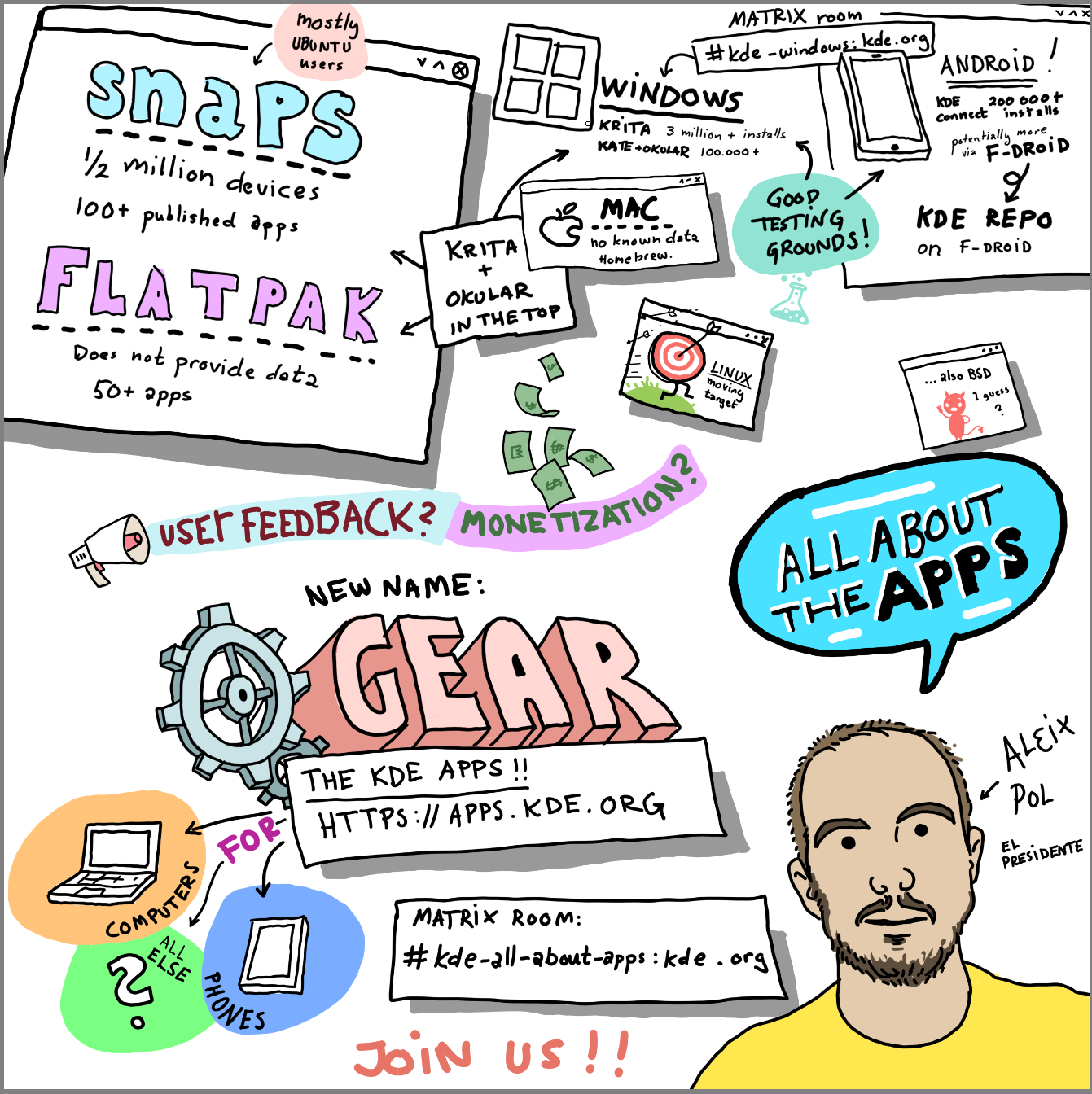Akademy 2021 - Day 2

First thing in the morning, Aleix Pol, president of KDE, introduced the event at and explained how Akademy 2021 was still "special" because we could still not meet in person.
Aleix then introduced the first keynote speaker of the event: Patricia Aas, co-founder of TurtleSec and a C++ developer and trainer. In her talk, Patricia explored bugs, types of bugs, how to deal with the secondary problems bugs create.
Then Aleix was back with his own talk, in which he told us about KDE's "All about the apps" goal. The goal encourages community members to develop, improve and help distribute KDE apps. Thism it turns out, is especially important for new KDE environments, such as Plasma Mobile! He explained how the goal is going and encouraged people to join the effort.

Niccolò Venerandi took over and talked about the "Consistency" goal. The Consistency goal seeks to make sure all KDE elements integrate well with each other, and makes sure the look and feel of apps and environments are similar across the board. He explained, with live drawings, how people working on this goal establish rules for each of the elements in graphical elements, such as app windows, and how that has contributed to apps gracefully integrating with each other.
Méven Car then talked about all the progress made by the people working on the Wayland goal, and Vlad Zahorodnii covered the next steps of what would soon be arriving.
All the goal Champions, Aleix, Meven and Niccolò, got together with Adam Szopa and Lydia Pintscher and talked about their projects and how they help focus the efforts of the KDE community. Although, as Lydia pointed out, it is not the only way to get things done in KDE, it is a good way to start and understand what KDE's main concerns and aims are.
The morning ended with four lightning talks, in which Anupam Basak talked about how to use Qt with Python; Carl Schwan analyzed the health of the KDE Community with some very illuminating (and colorful!) graphics and charts; Andreas Cord-Landwehr talked about SPDX License Markers in KDE, that is markers placed inside code that identifies the license the code is distributed under and that can be read by a machine (saving a lot of money in legal fees!). Finally, David Redondo talked about Power Profiles in Plasma, that is, how Plasma manages the power it needs, the state of the battery and so on.
The evening talks started at 17:00 UTC with the Sponsors' Talks, where the companies and organizations that helped finance Akademy explained their products and services, and the role Open Source software plays in their businesses. Mbition, KDAB, Qt Company, GitLab, Fedora all delivered talks.
Later, in Room 1, Nicolas Fella used his talk "What's cooking for KDE Frameworks 6" to explain the work being carried out to build KF6. KF6 is the version of KDE Frameworks which will use, and be compatible with Qt6. In the talk, developers learned about upcoming changes and how they could contribute to the effort.
Meanwhile, in Room 2, in his talk "Staying Indoors - OSM indoor maps for KDE Itinerary", Volker Krause observed that providing information about the insides of building, such as big stations and airports, can be vital for travelers. Unfortunately, often the data you get from online services is confusing and overwhelming. Volker explained how KDE's Itinerary app splits up the information, making large buildings easier to navigate.
At 20 past six, Dan Leinir Turthra Jensen took over in Room 1 and told us their History of Software Distribution, and explored the many ways they have tried to get software to users.
At the same time, in room 2, Daniel Vrátil, introduced us to C++ Coroutines, a new feature in C++ 20. He explained how coroutines can be used with certain Qt operations, such as DBus calls, network replies, and so on.
Then Massimo Stella presented Kdenlive, KDE's advanced video-editing software. In his talk, he covered the Kdenlive's new features, such as the "smart" subtitler, the zoom bars in the timeline, and same-track transitions.
Meanwhile, in room 2, Kevin Ottens, in his presentation "KF6 the Architecture Overview - Time to Slice Things Up Yet Again", talked about how the KF5 offer was originally structured and how it has led to some issues over time. He then explained an idea that could help improve things while moving to KF6.
Back in room 1, Paul Brown and Aniqa Khokhar explained to attendees how they can take advantage of the Promo team in "Promo as a Service", and how KDE members could improve the visibility of their projects.
Meanwhile, in room 2, David Edmundson was delivering "Wayland for Qt application developers". In his talk, he explored what Wayland means for Qt application developers, and some common traps and pitfalls and how to avoid them.
During the last session in room 1, Cornelius Schumacher explained in "Towards sustainable computing" what the impact computing had on our environment and talked about strategies KDE could adopt to become more efficient, and how developers could create apps that used less energy.
Finally, in room 2, Alexander Saoutkin used his talk "ARM Memory Tagging Extension - Fighting Memory Unsafety with Hardware" to explore the threats posed by memory unsafety in C++ programs and some new tools that help minimize them.
Although it is not the best way to watch the talks, if you are in a hurry to watch a specific session, there is a raw and unedited recording of the talks on YouTube:
- Talks Day 2 - Room 1 - Session 1 (Morning)
- Talks Day 2 - Room 1 - Session 2 (Evening)
- Talks Day 2 - Room 2
Meanwhile, our video editors are hard at work cutting and improving the footage, and we will have high quality videos of the talks up and available soon.